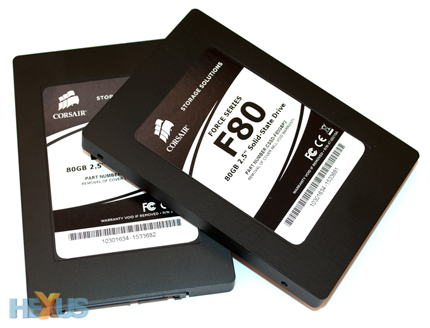Final thoughts and rating
If you've got £175 to spend, it's hard to ignore the impressive performance of Corsair's F80 drive.
But that's a big if, as the majority of consumers are likely to be put off by a cost of over £2 per gigabyte.
And, if performance isn't paramount, there are immediate alternatives; other 80GB SSDs can be had for under £160 and a variety of quick 64GB models are now available at around the £100 mark.
But with the enthusiast user in mind, Corsair's Force Series range is all about delivering results and it doesn't disappoint.
The Force Series F80 is the quickest 80GB SSD we've ever seen, and two of them in a RAID 0 configuration deliver jaw-dropping numbers.
Get past the price barrier and you'll find that the F80 is everything an SSD should be - fast, smooth and roomy enough to act as a system drive.
The Good
Excellent read and write performance
Ideal capacity for a system drive
TRIM support
The Bad
Costs over £2 per GB
HEXUS Rating

Corsair Force Series F80
HEXUS Awards

Corsair Force Series F80
HEXUS Where2Buy
The Corsair Force Series F80 solid-state drive can be purchased from SCAN.co.uk*.
HEXUS Right2Reply
At HEXUS, we invite the companies whose products we test to comment on our articles. If any company representatives for the products reviewed choose to respond, we'll publish their commentary here verbatim.
*As always, UK-based HEXUS.community forum members will benefit from the SCAN2HEXUS Free Shipping initiative, which will save you a further few pounds plus also top-notch, priority customer service and technical support backed up by the SCANcare@HEXUS forum.














